Background:
This post continues a comparison of a number of Mk7 GTI Stage 2 ECU tunes.
In this post, an IS20 Stage 2 tune from Unitronic is installed on a Mk7 GTI and engine and vehicle performance data are recorded for comparison with other stage 2 tune options.
Unitronic is a Canadian-based tuner with dealers in the United States. Close to me in Orlando Florida is FS-Tuning who are a Unitronic dealer so I took the GTI in to have the Unitronic IS20 Stage 2 tune installed.
Test procedure:
Information about the data collection procedures is found on the main test page.
An overview of one data collection session is shown below:
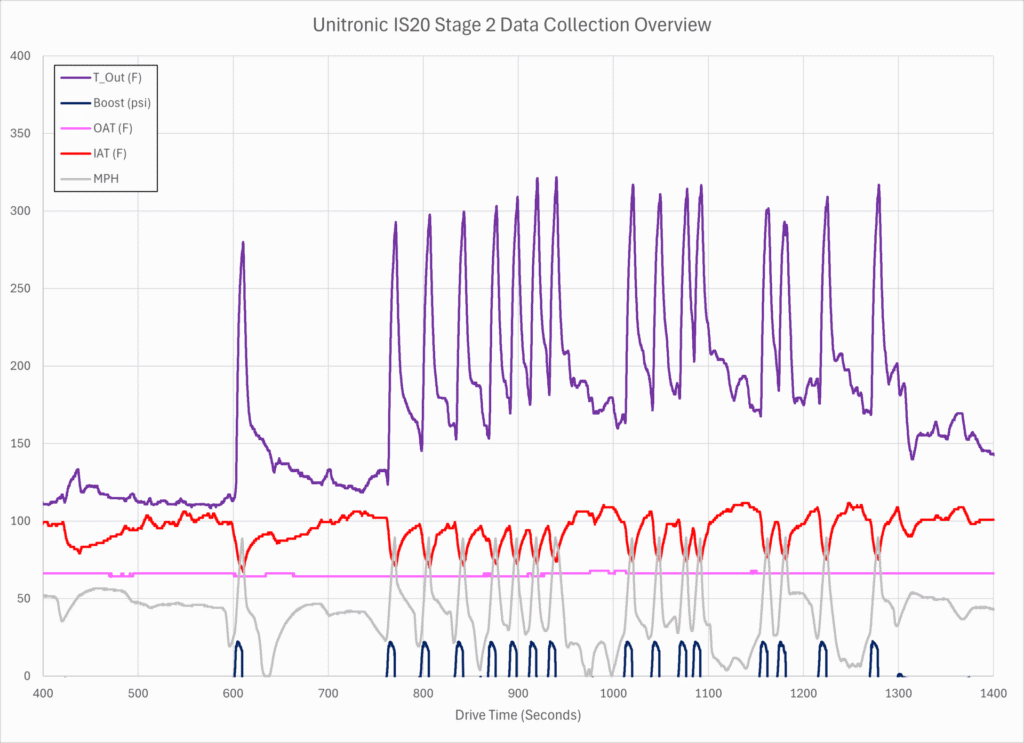
Unitronic Test Results:
The next four charts show the typical changes in engine operating variables as engine RPM increases during multiple third-gear full-throttle pulls.
The air-to-fuel ratio is shown with the red lines and the intake air temperature with the pink and purple lines.
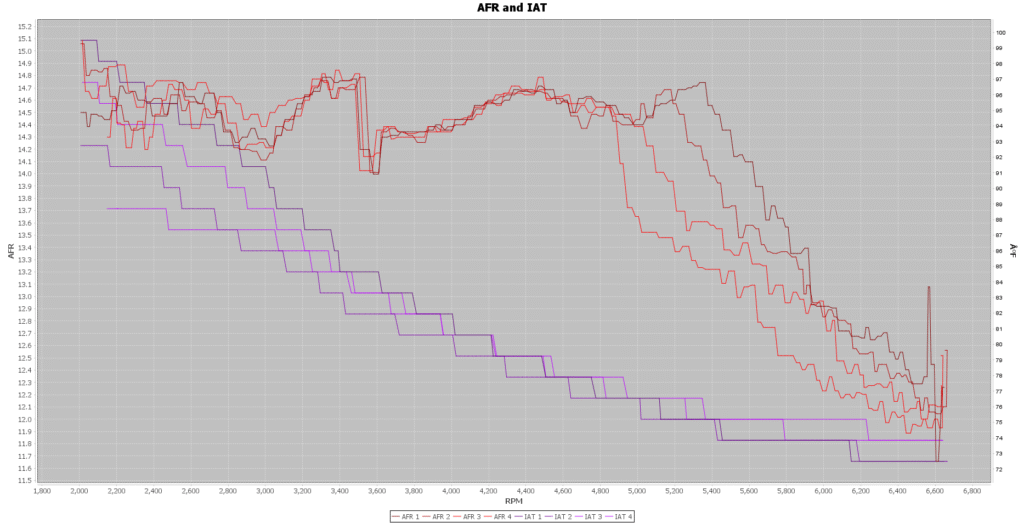
Boost (red lines) and turbocharger wastegate duty cycle (pink and purple lines):
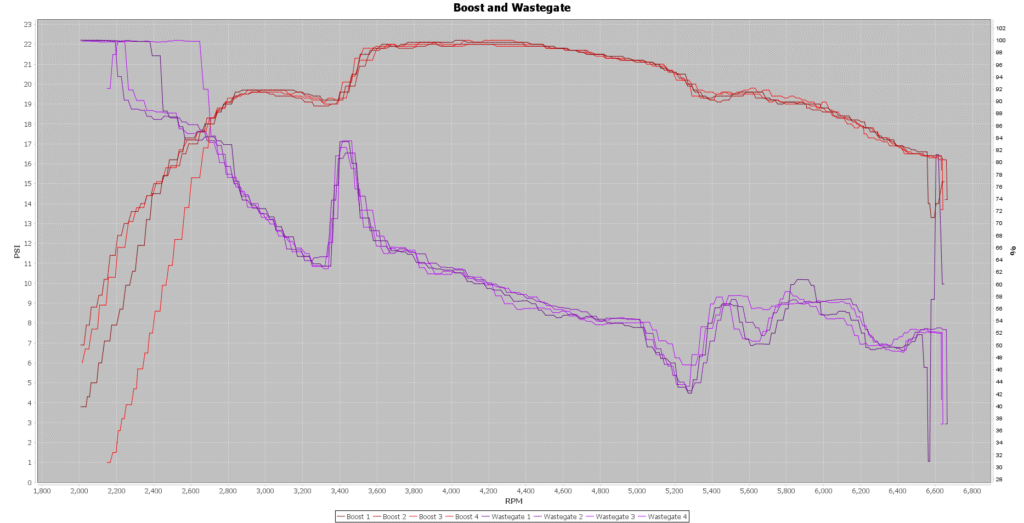
The Ignition Timing Advance (red lines) and occurrences of ignition timing retard (yellow, green, and pink lines):
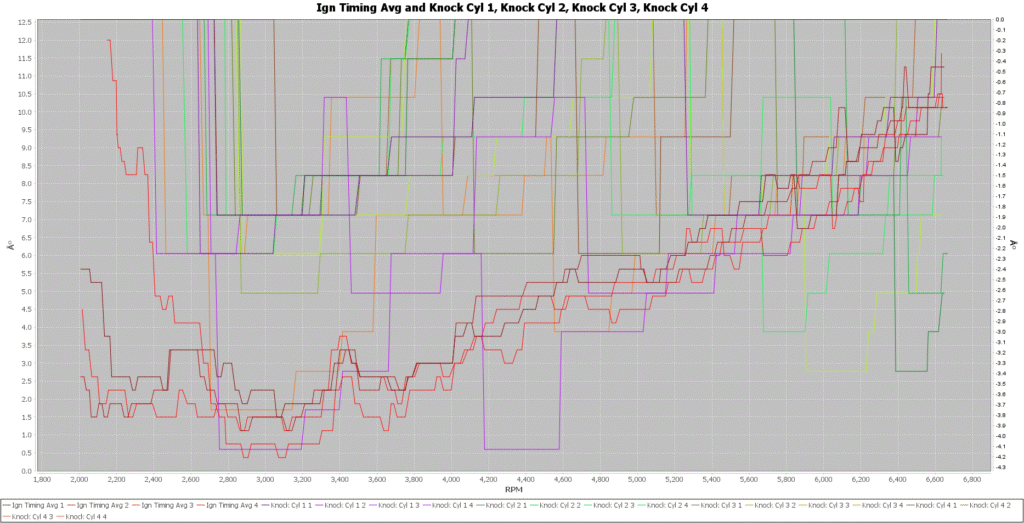
Low-pressure fuel pump duty cycle (red lines) and fuel rail pressure (pink and purple lines):
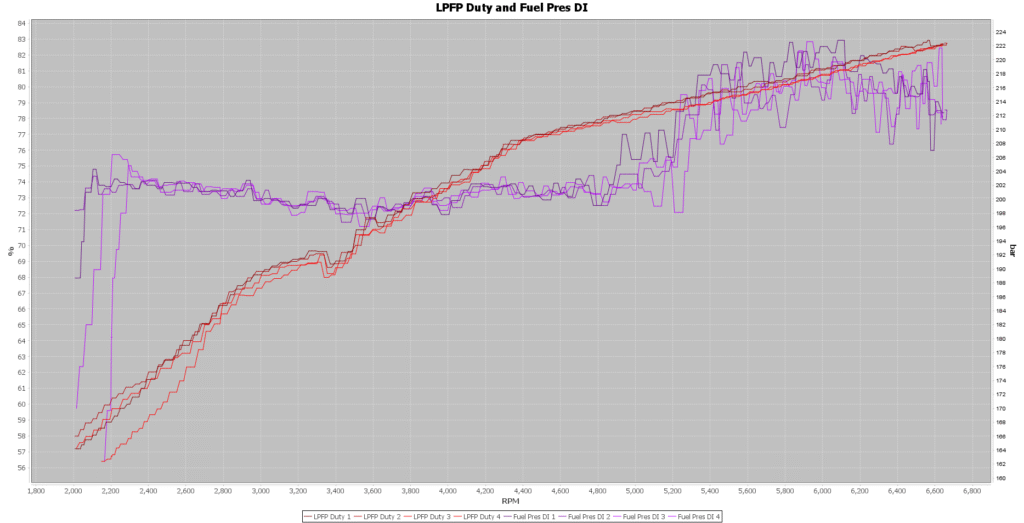
The next chart shows an overview of a series of pulls with a row assigned to each engine cylinder.
The red line is the boost pressure and the white lines are occurrences of ignition timing retard.
This data is used to calculate a Knock Retard Percentage (KR %) which is discussed in detail in the Stratified OTS IS20 Tune Datalog Refinement post in the section titled “KR Percentage”.
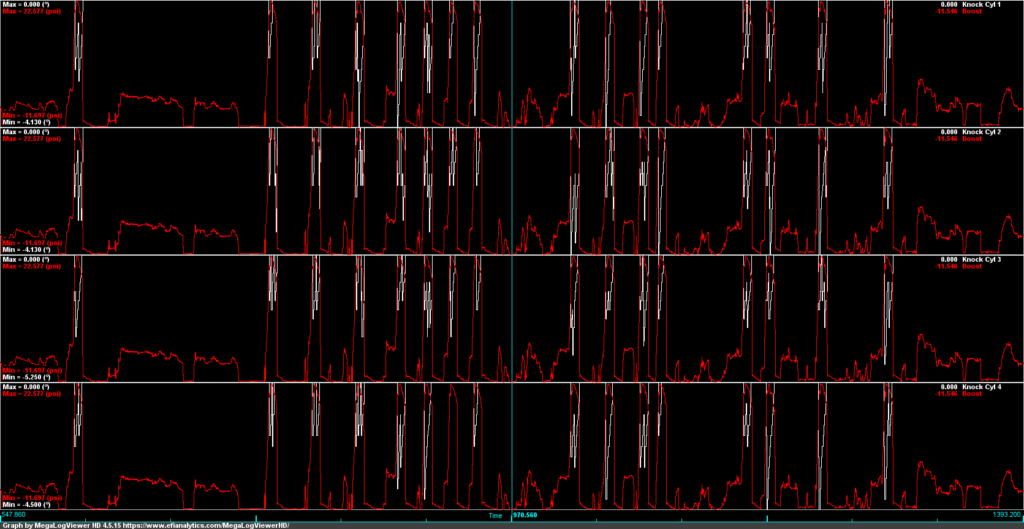
Over a total of 21 pulls, a portion of which is shown above, an occurrence of timing reduction during a pull was recorded during 100% of opportunities.
The next chart shows trends between all of the tunes that have been tested.
The average boost pressure that the tunes operate at between 2900 to 5000 rpm is plotted along with the Knock Retard percentages.
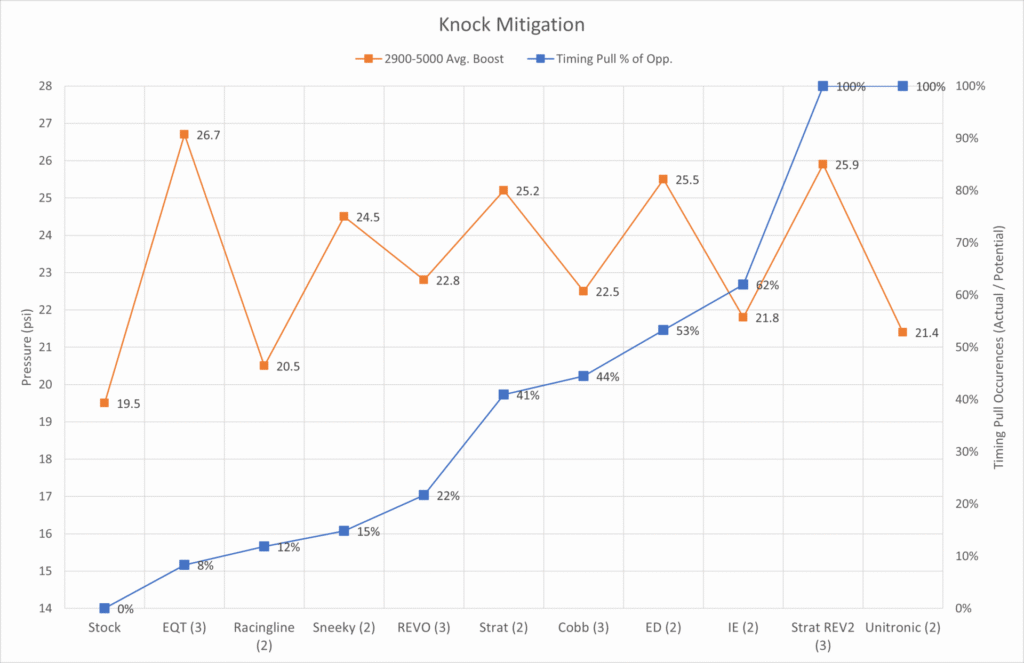
The next chart shows a subset of pulls made to calculate an estimated peak wheel horsepower.
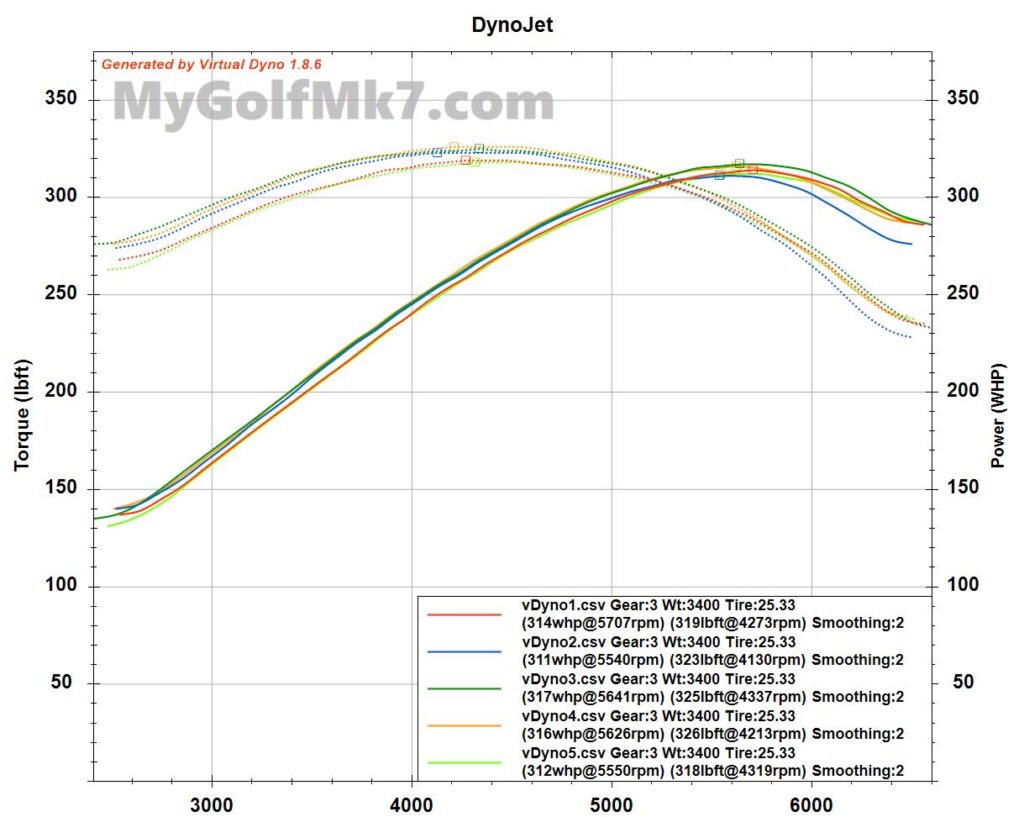
Aftermarket Tune Comparison:
The following charts show a comparison of the Unitronic tune with other aftermarket tunes that I previously tested.
The number in parenthesis (x) is the number of individual samples making up the average.
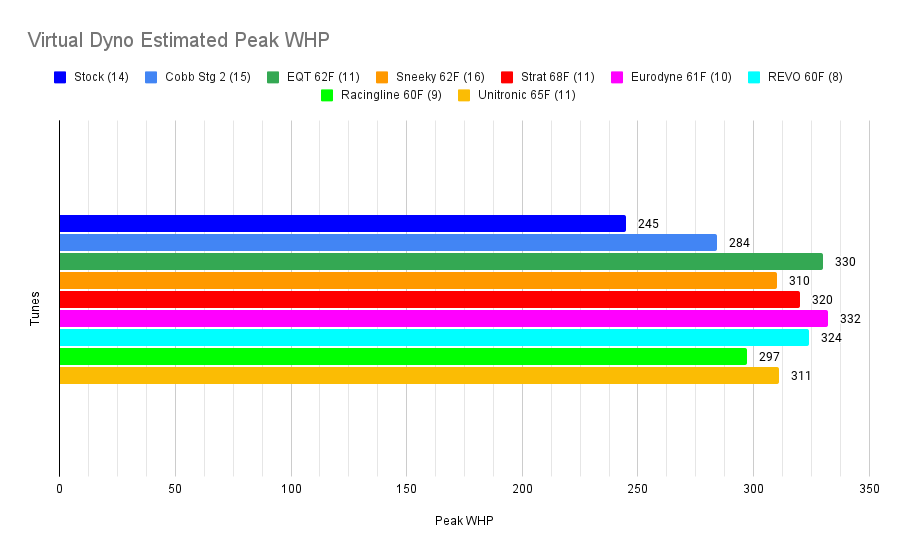
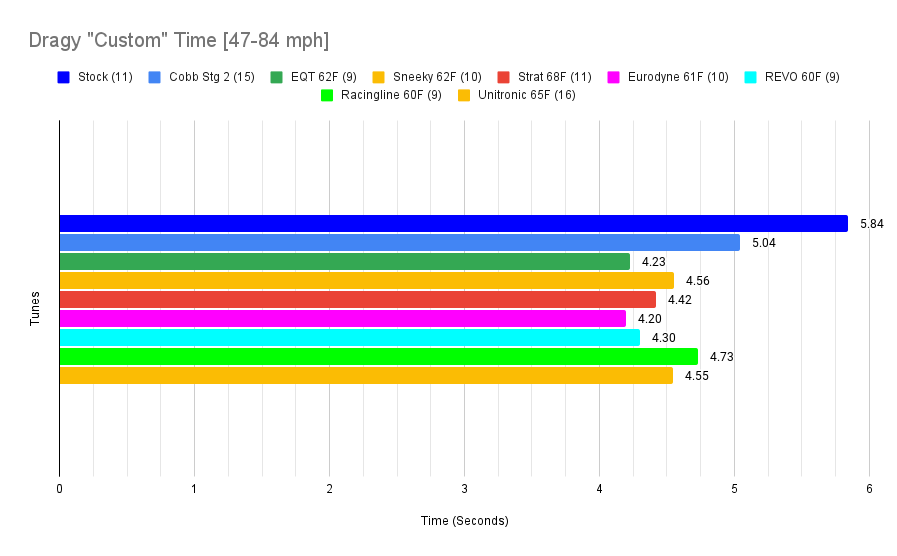
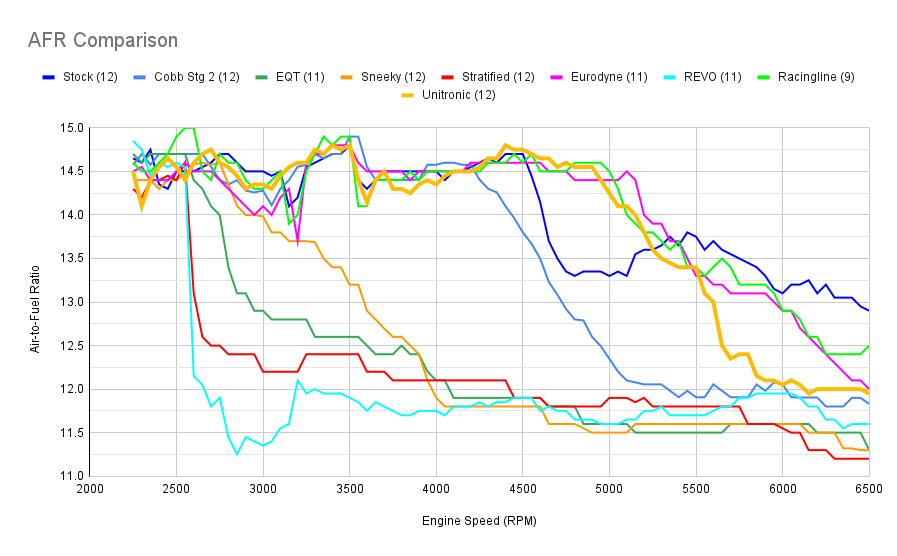
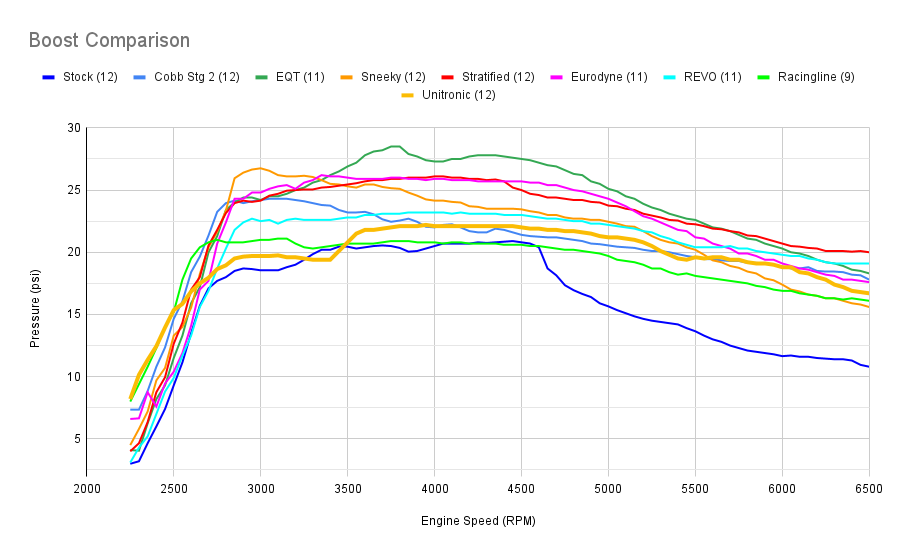
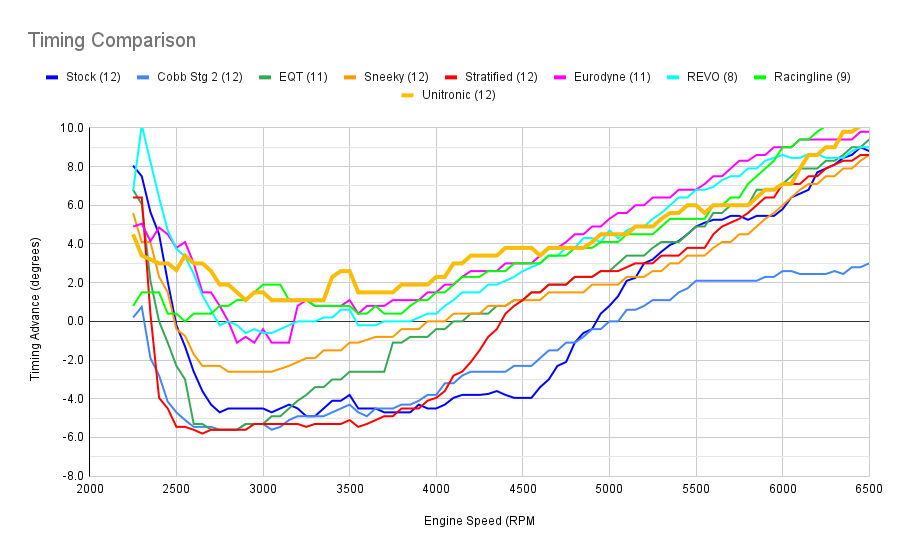
Conclusions:
The Unitronic 2 IS20 tune for the Mk7 GTI was tested to record engine and vehicle performance variables to compare with other aftermarket Stage 2 tunes.
The Unitronic tune produced acceleration times over the custom time interval and estimated peak wheel horsepower that are comparable with the other IS20 Stage 2 tunes recorded thus far.
Peak WHP trailed the top measurement (Eurodyne) by 6% WHP and the Dragy acceleration time trailed the top measurement (Eurodyne) by 8%.

So am I reading this correctly that Uni isn’t numbing the sensors much at all? Would be interesting for you to now add a few gal of E85 and re-test to zero out the KR.
Since the noise and threshold aren’t able to be measured directly, as with the Cobb tunes, drawing a conclusion about whether or not that is occurring, and to what degree, is an educated guess. Based upon the frequency of occurrence and the average boost level it appears the Unitronic tune does not raise the threshold by much, if at all. I did make a fuel change with the Stratified tune, but not Unitronic.
Relative to the others, it looks like Uni runs more timing advance, less boost, and one of the leaner fuel trims. Might this make it more sensitive to fuel quality and octane number than other tunes? Or is this more about differences in the knock mitigation strategies between the different tunes. I’ve seen claims in forums about Uni tunes being “sensitive” to fuel quality and more prone to retarding timing than tunes that favoured more boost and richer AFR with less timing.
Of the three variables, two are increasing the temperature and pressure in the cylinder, and the other is lowering it, relative to some of the other tunes. What’s the combined effect on the likelihood of detonation versus other tunes? I don’t know.
I can say that with 100% certainty, the Uni tune on my 1.8 gen 3 wagon is sensitive to fuel quality. I’ve logged my car ’00s of times and track it. The issue typically is in the winter (mid-Atlantic region) as winter blend fuel will ignite easier (at the same octane rating) than summer so I usually run 2.5 gal of E85 to a 14.5 gal tank (E~22) to reduce KR b/c if it is consistently above -4 it will attempt to run richer and richer to cool the cylinder temps and eventually misfire/EPC if you are on it at high RPM in third/fourth (reference – comms with Unitronic). My car (IS38 1.8 awd wagon w/DSG) sees 14.5 deg max advance at redline with good fuel at 21.5 psi boost tapering to 19 during a third gear pull, this is WAY more advance than most tuners for a pump gas tune.
As hard as I drive mine and as much KR as I have seen, my car has been bullet proof for almost 6 years/100K miles (with lots of tracking) and this is likely due to the factory safeties remaining in-place/the knock sensors’ sensitivity being appropriate…at least that is how I understand it. It also seems from your log of the GTI/2.0 that the 1.8 tune may be a bit more spicy w/r to advance.
I’d give a few gallons of e85 a shot on the Uni tune, would make a good bit of data/post. My tune actually says “93/e20” when I hook up my Uni cable.
I don’t have the IS20 installed anymore.

I’ve got a 2017 Mk7 R with factory port injection, EU spec, and just one cat. About a year ago, I installed Unitronic Stage 1+ ECU & TCU ‘cause I knew their tune gets more out of combustion optimization than just cranking up the boost. Over here, we’ve got E5 100+ RON fuel, which is like 96+ Octane in the US & NAR (so no need for ethanol to bump up the octane).
Long story short, the tune is absolutely bullet proof – no issues at all. The car drives super smooth, almost like it came this way from the factory. I’ve done over 30,000 km in the past year, and I’m still amazed at how refined it feels, considering all the stuff I’ve put it through.
The only mod I’ve done to the intake is a turbo elbow and turbo muffler delete from Leyo, kept the stock accordion hose, removed the snow grate, left the stock paper filter, opened up the left side of the intake scoop, and blocked off the right side with a GTE blanking plate. The car runs 100-200 km/h in 9.x seconds, right up there with an M550i or X6M Comp, as long as intake temps don’t go above 40°C. Got a Do88 intercooler coming soon.
Honestly, I don’t feel the need for Stage 2 – it’s fully compliant and plenty fast as is. A lot of the intake mods I did were thanks to this site… Keep up the good work!
Thanks for letting me know the site has been helpful to you!